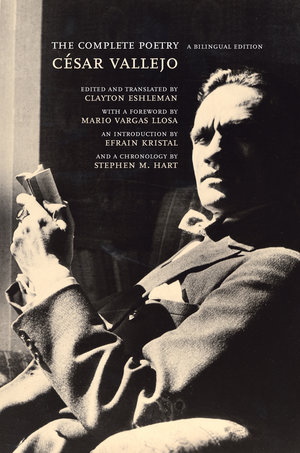
Clayton Eshleman (1935-2021) was a poet and essayist as well as Professor Emeritus of English at Eastern Michigan University. He founded and edited two of mid-century American poetry’s most seminal and highly-regarded literary magazines, Caterpillar and Sulfur. A recipient of the National Book Award and the Landon Translation Prize, he was the co-translator of Aimé Césaire: The Collected Poetry and the author of Juniper Fuse: Upper Paleolithic Imagination & the Construction of the Underworld. Between 1979 and 1986, Eshleman was a regular reviewer for The Los Angeles Times Book Review, contributing 51 articles on books by Rilke, Whitman, Bishop, Olson, Milosz, Montale, Ashbery and many others. He translated books by Pablo Neruda, Antonin Artaud, Vladimir Holan, Michel Deguy, and Bernard Bador. Eshleman also received a Guggenheim Fellowship in Poetry, two Fellowships from the National Endowment for the Arts, two Fellowships from the National Endowment for the Humanities, and several research Fellowships from Eastern Michigan University. In addition to being shortlisted for the Griffin Poetry Prize, The Complete Poetry: A Bilingual Edition also received the 2008 Harold Morton Landon Translation Award from the Academy of American Poets.

The Complete Poetry: A Bilingual Edition 2008 Shortlist
Judges’ Citation
When Mario Vargas Llosa refers to the work of Clayton Eshleman as a sort of heroic enterprise, he is hitting the target – life given as an act of love.
Selected poems
by Clayton Eshleman
I tell myself: at last I have escaped the noise;
no one sees me on my way to the sacred nave.
Tall shadows attend,
and Darío who passes with lyre in mourning.
With innumerable steps the gentle Muse emerges,
and my eyes go to her, like chicks to corn.
Ethereal tulles and sleeping titmice harass her,
while the blackbird of life dreams in her hand.
My God, you are merciful, for you have bestowed this nave,
where these blue sorcerers perform their duties.
Darío of celestial Americas! They are so much
like you! And from your braids they make their hair shirts.
Like souls seeking burials of absurd gold,
those wayward archpriests of the heart,
probe deeper, and appear … and addressing us from afar,
bewail the monotonous suicide of God!
Copyright © 2007, Clayton Eshleman, translated from the Spanish written by César Vallejo, The Complete Poetry: A Bilingual Edition, University of California Press
Altarpiece
the Spanish written by Cesar Vallejo
Children of the world,
if Spain falls — I mean, it’s just a thought —
if her forearm
falls downward from the sky seized,
in a halter, by two terrestrial plates;
children, what an age of concave temples!
how early in the sun what I was telling you!
how quickly in your chest the ancient noise!
How old your 2 in the notebook!
Children of the world, mother
Spain is with her belly on her back;
our teacher is with her ferules,
she appears as mother and teacher,
cross and wood, because she gave you height,
vertigo and division and addition, children;
she is with herself, legal parents!
If she falls — I mean, it’s just a thought — if Spain
falls, from the earth downward,
children, how you will stop growing!
how the year will punish the month!
how you will never have more than ten teeth,
how the diphthong will remain in downstroke, the gold star in tears!
How the little lamb will stay
tied by its leg to the great inkwell!
How you’ll descend the steps of the alphabet
to the letter in which pain was born!
Children,
sons of fighters, meanwhile,
lower your voice, for right at this moment Spain is distributing
her energy among the animal kingdom,
little flowers, comets, and men.
Lower your voice, for she
shudders convulsively, not knowing
what to do, and she has in her hand
the talking skull, chattering away,
the skull, that one with the braid,
the skull, that one with life!
Lower your voice, I tell you;
lower your voice, the song of the syllables, the wail
of matter and the faint murmur of the pyramids, and even
that of your temples which walk with two stones!
Lower your breath, and if
the forearm comes down,
if the ferules sound, if it is night,
if the sky fits between two terrestrial limbos,
if there is noise in the creaking of doors,
if I am late,
if you do not see anyone, if the blunt pencils
frighten you, if mother
Spain falls — I mean, it’s just a thought —
go out, children of the world, go look for her!…
Copyright © 2007, Clayton Eshleman, translated from the Spanish written by César Vallejo, The Complete Poetry: A Bilingual Edition, University of California Press
Spain, Take This Cup From Me
the Spanish written by Cesar Vallejo
When they turned off the lights, I felt like laughing. Things renewed their labors in the dark, at the point where they had been stopped; in a face, the eyes lowered to the nasal shells and took an inventory of certain missing optical powers, retrieving them one by one; a naval scale imperiously summoned the scales of a fish; three parallel raindrops halted at the height of a lintel, awaiting another drop that doesn’t know why it has been delayed; the policeman on the corner blew his nose noisily, emphasizing in particular his left nostril; the highest and the lowest steps of a spiral staircase began to make signs to each other that alluded to the last passerby to climb them. Things, in the dark, renewed their labors, animated by an uninhibited happiness, conducting themselves like people at a great ceremonial banquet, where the lights went out and all remained in the dark.
When they turned off the light, a better distribution of boundaries and frames was carried out around the world. Each rhythm was its own music; each needle of a scale moved as little as a destiny could move, that is to say, until nearly acquiring an absolute presence. In general, a delightful game was created between things, one of liberation and justice. I watched them and grew content, since in myself as well the grace of the numeral dark curvetted.
I don’t know who let there be light again. The world began to crouch once more in its shabby pelts: the yellow one of Sunday, the ashen one of Monday, the humid one of Tuesday, the judicious one of Wednesday, sharkskin for Thursday, a sad one for Friday, a tattered one for Saturday. Thus the world reappeared, quiet, sleeping, or pretending to sleep. A hair-raising spider with three broken legs emerged from Saturday’s sleeve.
Copyright © 2007, Clayton Eshleman, translated from the Spanish written by César Vallejo, The Complete Poetry: A Bilingual Edition, University of California Press
The Footfalls of a Great Criminal
the Spanish written by Cesar Vallejo